Content from the Brookings Doha Center is now archived. In September 2021, after 14 years of impactful partnership, Brookings and the Brookings Doha Center announced that they were ending their affiliation. The Brookings Doha Center is now the Middle East Council on Global Affairs, a separate public policy institution based in Qatar.
The June 2014 takeover of Mosul by the Islamic State group (ISIS) was described as an existential threat to the Iraqi state and the post-2003 political order. Yet, its emergence was only a symptom of a broader series of crises that had engulfed Iraq over the past decade. While militant groups dominate headlines, it is Iraq’s structural problems that have enabled their emergence. This includes weakened or partly collapsed institutions; the absence of the rule of law; dysfunctional and corrupt governance; the ascendancy of sectarian divisions; and the disastrous post-conflict reconstruction process that followed the aftermath of the 2003 U.S. invasion. State fragility in the Levant and the regional proxy war in Syria have exacerbated these challenges and have stifled Iraq’s efforts to stabilize and rehabilitate its institutions.
There are competing visions for the future of Iraq and the region that have manifested themselves through violent, sectarian conflict over the Iraqi state and its resources, such as the 2006 civil war between Arab Sunnis and Shiites and the war on ISIS. Militant organizations like ISIS, remnants of the former Baath regime, Shiite militia groups, and regional powers have deployed sectarian narratives to mobilize popular support, with disastrous consequences for Iraq’s stability. Yet, the Iraqi state and society have not fully succumbed to these challenges, and there has been substantial pushback against the political elites who have used sectarianism to deflect attention away from good governance.
This paper examines more closely how Iraq has moved to constrain the space for militant groups and sectarian political elites who have dominated the Iraqi political landscape for more than a decade. It argues that Iraq needs to redefine and reimagine the Iraqi national interest, a concept that has been painfully missing since 2003. This can be done by forming a strong nexus between citizen and state through a process of reinforcing non-state actors that are strongly positioned to cultivate a unified national interest and to move beyond sectarian rhetoric and policies. Finally, this paper contends that an organized, decentralized system represents the most effective political framework for cultivating a stronger Iraqi national interest. This combination of top-down decentralization and bottom-up mobilization from civil society will help limit the space for violent sectarianism.
The Brookings Institution is committed to quality, independence, and impact.
We are supported by a diverse array of funders. In line with our values and policies, each Brookings publication represents the sole views of its author(s).




